Overview
- Description
- The papers contain correspondence between Johanna and Wilhelm Schischa in the ghetto in Opole, Poland, and their daughter, Lilly, in England; photographs of the Schischas and the Opole ghetto; documents concerning Lilly's emigration to London, England, from Vienna, Austria, on the Kindertransport in 1939; and correspondence between Lilly and her elder brother, Edi, who immigrated to Palestine in the early 1930s.
- Date
-
inclusive:
1930-1950
- Credit Line
- United States Holocaust Memorial Museum Collection, Gift of Lilli Schischa Tauber
- Collection Creator
- Lilly Schischa Tauber
- Biography
-
Karoline (Lilli/Lilly) Schischa was born on March 13, 1927, to Wilhelm and Johanna Friedmann Schischa in Vienna, Austria. Wilhelm was born in Gloggnitz in lower Austria on October 11, 1883, the oldest son of Josef and Karoline Gerstl. He had three siblings, Paula, Helene, and Adolf. Josef, originally from Mattersdorf, was a master tailor and was very religious. Wilhelm’s mother died in 1894 and his father remarried Anna Guenser and had four children, Ludwig, Richard, Malwine (d. 1927), and Erna. Lilli’s mother Johanna was born in 1885 and had two sisters Berta Ohme and Fanny Bauer. Lilli was raised in Wiener Neustadt, along with her older brother, Eduard (Edi), who was born on October 5, 1914. Lilli’s family was very religious and followed Jewish traditions. The Schischas owned a menswear store in Wiener Neustadt which was seized after the Anschluss, the integration of Austria with Nazi Germany in March 1938. Edi emigrated to Palestine that October. During the Kristallnacht pogrom that November 9-10, Wilhelm was arrested and detained in prison for ten days. He was then forced to sell their home. Lilli became ill with scarlet fever and had to be hospitalized. After she recovered, she joined her mother in Vienna, where she had gone with her sister-in-law. On July 13, 1939, Lilli was sent on a Kindertransport to Great Britain. As they waited at the train station, her father put both hands on her head and blessed her.
Lilli was sent to live with a group of Jewish refugee girls at the Hackney hostel in London, but soon transferred to Cockley Cley estate in Swaffham, Norfolk. She worked as a seamstress. The war ended with Germany’s surrender on May 7, 1945. Lilli eventually learned that her parents Wilhelm and Johanna, unable to secure visas, were deported from Vienna to the ghetto in Opole Lubelskie in German occupied Poland on February 26, 1941. In spring 1942, the Germans liquidated the ghetto. The Jewish residents were sent to Belzec and Sobibor killing centers and Lilli's parents presumably perished there.
Lilli returned to postwar Vienna in 1946 or 1947 as a member of the Young Austria Refugee, a group dedicated to creating a democratic Austria. She was reunited with her mother's sister Berta Ohme, who had not been deported because her husband was not Jewish. Berta had preserved a collection of documents, correspondence, and photographs that Lilli’s mother gave her just before she was deported to Opole. Along with these, she gave Lilli correspondence sent by Johanna and Wilhelm from Opole. Lilli married Max Tauber in 1954. Max, who was also Jewish, was born in Vienna on June 11, 1920, and had lived in Jerusalem. They have two sons. Lilli’s brother Edi lived in Israel until his death in 1963, age 49.
Physical Details
- Genre/Form
- Birth certificates. Correspondence. Photographs.
- Extent
-
1 box
Rights & Restrictions
- Conditions on Access
- There are no known restrictions on access to this material.
- Conditions on Use
- Material(s) in this collection may be protected by copyright and/or related rights. You do not require further permission from the Museum to use this material. The user is solely responsible for making a determination as to if and how the material may be used.
Keywords & Subjects
Administrative Notes
- Holder of Originals
-
United States Holocaust Memorial Museum
- Legal Status
- Permanent Collection
- Provenance
- The papers were donated to the United States Holocaust Memorial Museum in 2003 by Lilly Schischa Tauber.
- Record last modified:
- 2023-05-01 10:16:47
- This page:
- https://collections.ushmm.org/search/catalog/irn514971
Download & Licensing
- In Copyright - Use Permitted
- Terms of Use
- This record is not digitized and cannot be downloaded online.
In-Person Research
- Request 7 Days in Advance of Visit
- Plan a Research Visit
-
Request in Shapell Center Reading Room
Bowie, MD
Contact Us
Also in Lilli Schischa Tauber family collection
The collection consists of three detachable collars, comb, shoulder bag, thirteen handkerchiefs, a leather portfolio, travel sewing kit and two thread sets, correspondence, documents, and photographs relating to the experiences of Lilli Schischa and her family in Austria before and during the Holocaust and after Lilli's escape to Great Britain on a Kindertransport in 1939.
Date: 1930-1950
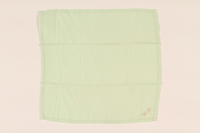
Green handkerchief with pink KS monogram carried by a Kindertransport refugee
Object
Light green handkerchief with her initials KS taken with 11 year old Lilli (Karoline) Schischa when she was sent on a Kindertransport from Austria to Great Britain on July 13, 1939. In March 1938, Nazi Germany marched into Austria and made it part of the Third Reich. Policies persecuting Jews and depriving them of their property and livelihoods were enacted. The clothing store owned by Lilly's parents, Wilhelm and Johanna, in Wiener Neustadt was seized. Lilli's brother, Edi, 24, left for Palestine in October 1938. Her father was arrested during the Kristallnacht pogrom that November 9-10, but released after ten days, and forced to sell their home. Her parents got Lilli passage on the Children's Transport leaving in July 1939. Her parents were deported on February 26, 1941, to the ghetto in Opole in German occupied Poland. They perished in the ghetto or in Sobibor killing center. Lilli returned to Vienna ca. 1947.
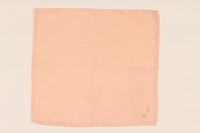
Peach handkerchief with a pink monogram carried by a Kindertransport refugee
Object
Pale orange handkerchief with her initials KS kept by 11 year Lilli (Karoline) Schischa when she was sent on a Kindertransport from Austria to Great Britain on July 13, 1939. In March 1938, Nazi Germany marched into Austria and made it part of the Third Reich. Jewish persecution. The clothing store owned by Lilli's parents, Wilhelm and Johanna, in Wiener Neustadt was seized. Lilli's brother, Edi, age 24, left for Palestine in October 1938. Her father was arrested during the Kristallnacht pogrom that November, but released after ten days. Her parents were able to get Lilli out of the country, but in February 1941, they were deported to the ghetto in Opole, Poland. They perished in the ghetto or in Sobibor death camp. Lilli returned to Vienna ca. 1947.
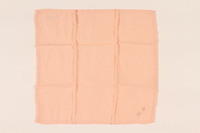
Pale orange handkerchief with a pink monogram carried by a Kindertransport refugee
Object
Peach handkerchief with her pink embroidered initials KS kept by 11 year Lilli (Karoline) Schischa when she was sent on a Kindertransport from Austria to Great Britain on July 13, 1939. In March 1938, Nazi Germany marched into Austria and made it part of the Third Reich. Jewish persecution. The clothing store owned by Lilli's parents, Wilhelm and Johanna, in Wiener Neustadt was seized. Lilli's brother, Edi, age 24, left for Palestine in October 1938. Her father was arrested during the Kristallnacht pogrom that November, but released after ten days. Her parents were able to get Lilli out of the country, but in February 1941, they were deported to the ghetto in Opole, Poland. They perished in the ghetto or in Sobibor death camp.
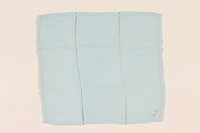
Light blue handkerchief with a pink monogram carried by a Kindertransport refugee
Object
Light blue handkerchief with her embroidered initials KS kept by 11 year Lilli (Karoline) Schischa when she was sent on a Kindertransport from Austria to Great Britain on July 13, 1939. In March 1938, Nazi Germany marched into Austria and made it part of the Third Reich. Jewish persecution. The clothing store owned by Lilli's parents, Wilhelm and Johanna, in Wiener Neustadt was seized. Lilli's brother, Edi, age 24, left for Palestine in October 1938. Her father was arrested during the Kristallnacht pogrom that November, but released after ten days. Her parents were able to get Lilli out of the country, but in February 1941, they were deported to the ghetto in Opole, Poland. They perished in the ghetto or in Sobibor death camp..
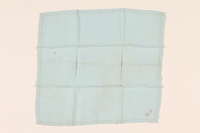
Light blue handkerchief with a pink monogram carried by a Kindertransport refugee
Object
Blue handkerchief with her embroidered initials KS kept by 11 year Lilli (Karoline) Schischa when she was sent on a Kindertransport from Austria to Great Britain on July 13, 1939. In March 1938, Nazi Germany marched into Austria and made it part of the Third Reich. Jewish persecution. The clothing store owned by Lilli's parents, Wilhelm and Johanna, in Wiener Neustadt was seized. Lilli's brother, Edi, age 24, left for Palestine in October 1938. Her father was arrested during the Kristallnacht pogrom that November, but released after ten days. Her parents were able to get Lilli out of the country, but in February 1941, they were deported to the ghetto in Opole, Poland. They perished in the ghetto or in Sobibor death camp.
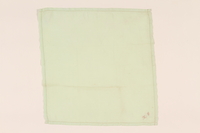
Light green handkerchief with a pink monogram carried by a Kindertransport refugee
Object
Light green handkerchief with her embroidered initials KS kept by 11 year Lilli (Karoline) Schischa when she was sent on a Kindertransport from Austria to Great Britain on July 13, 1939. In March 1938, Nazi Germany marched into Austria and made it part of the Third Reich. Jewish persecution. The clothing store owned by Lilli's parents, Wilhelm and Johanna, in Wiener Neustadt was seized. Lilli's brother, Edi, age 24, left for Palestine in October 1938. Her father was arrested during the Kristallnacht pogrom that November, but released after ten days. Her parents were able to get Lilli out of the country, but in February 1941, they were deported to the ghetto in Opole, Poland. They perished in the ghetto or in Sobibor death camp.
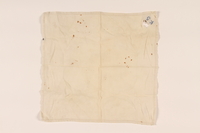
White handkerchief with a blue monogram carried by a Kindertransport refugee
Object
White handkerchief with her embroidered initials KS kept by 11 year Lilli (Karoline) Schischa when she was sent on a Kindertransport from Austria to Great Britain on July 13, 1939. In March 1938, Nazi Germany marched into Austria and made it part of the Third Reich. Jewish persecution. The clothing store owned by Lilli's parents, Wilhelm and Johanna, in Wiener Neustadt was seized. Lilli's brother, Edi, age 24, left for Palestine in October 1938. Her father was arrested during the Kristallnacht pogrom that November, but released after ten days. Her parents were able to get Lilli out of the country, but in February 1941, they were deported to the ghetto in Opole, Poland. They perished in the ghetto or in Sobibor death camp.
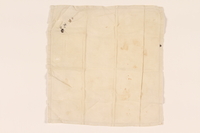
Offwhite handkerchief with a white initial carried by a Kindertransport refugee
Object
White handkerchief with her embroidered initials KS kept by 11 year Lilli (Karoline) Schischa when she was sent on a Kindertransport from Austria to Great Britain on July 13, 1939. In March 1938, Nazi Germany marched into Austria and made it part of the Third Reich. Jewish persecution. The clothing store owned by Lilli's parents, Wilhelm and Johanna, in Wiener Neustadt was seized. Lilli's brother, Edi, age 24, left for Palestine in October 1938. Her father was arrested during the Kristallnacht pogrom that November, but released after ten days. Her parents were able to get Lilli out of the country, but in February 1941, they were deported to the ghetto in Opole, Poland. They perished in the ghetto or in Sobibor death camp.
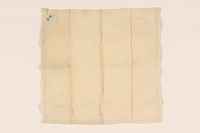
Offwhite handkerchief with two monograms carried by a Kindertransport refugee
Object
Cream handkerchief with her embroidered initials KS kept by 11 year Lilli (Karoline) Schischa when she was sent on a Kindertransport from Austria to Great Britain on July 13, 1939. In March 1938, Nazi Germany marched into Austria and made it part of the Third Reich. Jewish persecution. The clothing store owned by Lilli's parents, Wilhelm and Johanna, in Wiener Neustadt was seized. Lilli's brother, Edi, age 24, left for Palestine in October 1938. Her father was arrested during the Kristallnacht pogrom that November, but released after ten days. Her parents were able to get Lilli out of the country, but in February 1941, they were deported to the ghetto in Opole, Poland. They perished in the ghetto or in Sobibor death camp.
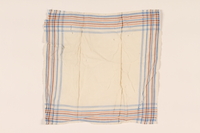
White handkerchief with blue, brown, and white stripes carried by a Kindertransport refugee
Object
White handkerchief with a striped border kept by 11 year Lilli (Karoline) Schischa when she was sent on a Kindertransport from Austria to Great Britain on July 13, 1939. In March 1938, Nazi Germany marched into Austria and made it part of the Third Reich. Jewish persecution. The clothing store owned by Lilli's parents, Wilhelm and Johanna, in Wiener Neustadt was seized. Lilli's brother, Edi, age 24, left for Palestine in October 1938. Her father was arrested during the Kristallnacht pogrom that November, but released after ten days. Her parents were able to get Lilli out of the country, but in February 1941, they were deported to the ghetto in Opole, Poland. They perished in the ghetto or in Sobibor death camp. Lilli returned to Vienna ca. 1947.
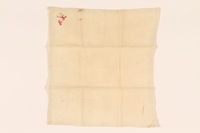
Offwhite handkerchief with a red monogram carried by a Kindertransport refugee
Object
Cream handkerchief with her initials KS kept by 11 year Lilli (Karoline) Schischa when she was sent on a Kindertransport from Austria to Great Britain on July 13, 1939. In March 1938, Nazi Germany marched into Austria and made it part of the Third Reich. Jewish persecution. The clothing store owned by Lilli's parents, Wilhelm and Johanna, in Wiener Neustadt was seized. Lilli's brother, Edi, age 24, left for Palestine in October 1938. Her father was arrested during the Kristallnacht pogrom that November, but released after ten days. Her parents were able to get Lilli out of the country, but in February 1941, they were deported to the ghetto in Opole, Poland. They perished in the ghetto or in Sobibor death camp. Lilli returned to Vienna ca. 1947.
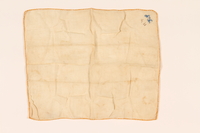
Offwhite handkerchief with a blue embroidered monogram carried by a Kindertransport refugee
Object
Cream handkerchief with her initials KS kept by 11 year Lilli (Karoline) Schischa when she was sent on a Kindertransport from Austria to Great Britain on July 13, 1939. In March 1938, Nazi Germany marched into Austria and made it part of the Third Reich. Jewish persecution. The clothing store owned by Lilli's parents, Wilhelm and Johanna, in Wiener Neustadt was seized. Lilli's brother, Edi, age 24, left for Palestine in October 1938. Her father was arrested during the Kristallnacht pogrom that November, but released after ten days. Her parents were able to get Lilli out of the country, but in February 1941, they were deported to the ghetto in Opole, Poland. They perished in the ghetto or in Sobibor death camp. Lilli returned to Vienna ca. 1947.
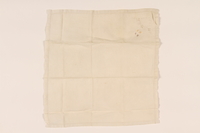
Offwhite handkerchief with floral whitework and a yellow monogram carried by a Kindertransport refugee
Object
Cream handkerchief with fowers and her initials KS kept by 11 year Lilli (Karoline) Schischa when she was sent on a Kindertransport from Austria to Great Britain on July 13, 1939. In March 1938, Nazi Germany marched into Austria and made it part of the Third Reich. Jewish persecution. The clothing store owned by Lilli's parents, Wilhelm and Johanna, in Wiener Neustadt was seized. Lilli's brother, Edi, age 24, left for Palestine in October 1938. Her father was arrested during the Kristallnacht pogrom that November, but released after ten days. Her parents were able to get Lilli out of the country, but in February 1941, they were deported to the ghetto in Opole, Poland. They perished in the ghetto or in Sobibor death camp. Lilli returned to Vienna ca. 1947.

White collar with lace trim carried by a Kindertransport refugee
Object
White lace trimmed collar made by her mother for 11 year old Lilli (Karoline) Schischa to take on the Kindertransport from Austria to Great Britain on July 13, 1939. In March 1938, Nazi Germany marched into Austria and made it part of the Third Reich. Jewish persecution. The clothing store owned by Lilli's parents, Wilhelm and Johanna, in Wiener Neustadt was seized. Lilli's brother, Edi, age 24, left for Palestine in October 1938. Her father was arrested during the Kristallnacht pogrom that November, but released after ten days. Her parents were able to get Lilli out of the country, but in February 1941, they were deported to the ghetto in Opole, Poland. They perished in the ghetto or in Sobibor death camp. Lilli returned to Vienna ca. 1947.
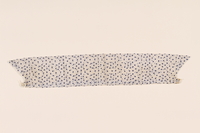
White collar with blue polka dots carried by a Kindertransport refugee
Object
Blue polka dot detachable collar made by her mother for 11 year old Lilli (Karoline) Schischa to take on the Kindertransport from Austria to Great Britain on July 13, 1939. In March 1938, Nazi Germany marched into Austria and made it part of the Third Reich. Jewish persecution. The clothing store owned by Lilli's parents, Wilhelm and Johanna, in Wiener Neustadt was seized. Lilli's brother, Edi, age 24, left for Palestine in October 1938. Her father was arrested during the Kristallnacht pogrom that November, but released after ten days. Her parents were able to get Lilli out of the country, but in February 1941, they were deported to the ghetto in Opole, Poland. They perished in the ghetto or in Sobibor death camp. Lilli returned to Vienna ca. 1947.
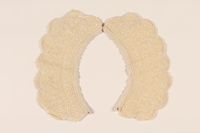
Embroidered yellow collar carried by a Kindertransport refugeec
Object
Embroidered, detachable pale yellow collar made by her mother for 11 year old Lilli (Karoline) Schischa to take on the Kindertransport from Austria to Great Britain on July 13, 1939. In March 1938, Nazi Germany marched into Austria and made it part of the Third Reich. Jewish persecution. The clothing store owned by Lilli's parents, Wilhelm and Johanna, in Wiener Neustadt was seized. Lilli's brother, Edi, age 24, left for Palestine in October 1938. Her father was arrested during the Kristallnacht pogrom that November, but released after ten days. Her parents were able to get Lilli out of the country, but in February 1941, they were deported to the ghetto in Opole, Poland. They perished in the ghetto or in Sobibor death camp. Lilli returned to Vienna ca. 1947.
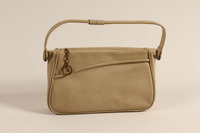
Beige leather purse with decorative piping used by a Kindertransport refugee
Object
Beige leather handbag with shoulder strap bought by Lilli (Karoline) Schischa in Great Briatin where she was sent on a Kindertransport from Austria on July 13, 1939. Lilli bought the purse in England ca. 1945 and used it to store the seventy letters she received from her brother Edi from Palestine. In March 1938, Nazi Germany marched into Austria and made it part of the Third Reich. The clothing store owned by Lilli's parents, Wilhelm and Johanna, in Wiener Neustadt was seized. Lilli's brother, Edi, 24, left for Palestine in October 1938. Her father was arrested during the Kristallnacht pogrom that November, but released after ten days. Her parents were able to get Lilli, then age 11, out of the country on a Kindertransport that left on July 13, 1939. Her parents were unable to get permits to leave and, on February 1941, were deported to the ghetto in Opole, Poland. They later perished in the ghetto or in Sobibor killing center. Lilli returned to Vienna ca. 1947.
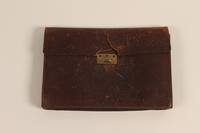
Brown leather portfolio carried by a Kindertransport refugee
Object
Leather case used by her father given to Lilli (Karoline) Schischa by her aunt when Lilli returned to Austria after the war ca. 1947. Her father Wilhelm used it to store the over fifity documents he gathered as he tried to secure visas for himself and Lilli's mother Johanna to leave Austria. In March 1938, Nazi Germany marched into Austria and made it part of the Third Reich. The clothing store owned by Lilli's parents, Wilhelm and Johanna, in Wiener Neustadt was seized. Lilli's brother, Edi, age 24, left for Palestine in October 1938. Her father was arrested during the Kristallnacht pogrom that November, but released after ten days. Her parents were able to get Lilli out of the country on a Kindertransport that left for Great Britain on July 13, 1939. Her parents were unable to get permits to leave and, on February 1941, were deported to the ghetto in Opole, Poland. They later perished in the ghetto or in Sobibor killing center. Lilli returned to Vienna ca. 1947.
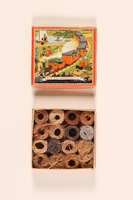
Travel sewing box with 16 floss spools carried by a Kindertransport refugee
Object
Travel sewing kit with a decorated box with 16 spools of thread bought for 11 year old Lilli (Karoline) Schischa to take on the Kindertransport from Austria to Great Britain on July 13, 1939. In March 1938, Nazi Germany marched into Austria and made it part of the Third Reich. Jewish persecution. The clothing store owned by Lilli's parents, Wilhelm and Johanna, in Wiener Neustadt was seized. Lilli's brother, Edi, age 24, left for Palestine in October 1938. Her father was arrested during the Kristallnacht pogrom that November, but released after ten days. Her parents were able to get Lilli out of the country, but in February 1941, they were deported to the ghetto in Opole, Poland. They perished in the ghetto or in Sobibor death camp. Lilli returned to Vienna ca. 1947.
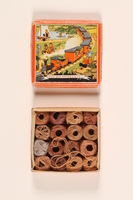
Travel sewing box with 16 floss spools carried by a Kindertransport refugee
Object
Travel sewing kit with a decorated box with 16 spools of thread bought for 11 year old Lilli (Karoline) Schischa to take on the Kindertransport from Austria to Great Britain on July 13, 1939. In March 1938, Nazi Germany marched into Austria and made it part of the Third Reich. Jewish persecution. The clothing store owned by Lilli's parents, Wilhelm and Johanna, in Wiener Neustadt was seized. Lilli's brother, Edi, age 24, left for Palestine in October 1938. Her father was arrested during the Kristallnacht pogrom that November, but released after ten days. Her parents were able to get Lilli out of the country, but in February 1941, they were deported to the ghetto in Opole, Poland. They perished in the ghetto or in Sobibor death camp. Lilli returned to Vienna ca. 1947.
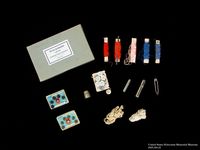
Sewing box with accessories carried by a Kindertransport refugee
Object
Travel sewing kit with 19 items, such as a thimble, snaps, needles, and thread bought for 11 year old Lilli (Karoline) Schischa to take on the Kindertransport from Austria to Great Britain on July 13, 1939. In March 1938, Nazi Germany marched into Austria and made it part of the Third Reich. Jewish persecution. The clothing store owned by Lilli's parents, Wilhelm and Johanna, in Wiener Neustadt was seized. Lilli's brother, Edi, age 24, left for Palestine in October 1938. Her father was arrested during the Kristallnacht pogrom that November, but released after ten days. Her parents were able to get Lilli out of the country, but in February 1941, they were deported to the ghetto in Opole, Poland. They perished in the ghetto or in Sobibor death camp. Lilli returned to Vienna ca. 1947.
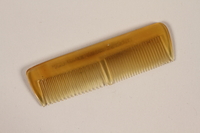
Yellow plastic comb with cardboard case carried by a Kindertransport refugee
Object
Comb with case kept by 11 year Lilly (Karoline) Schischa when she was sent on a Kindertransport from Austria to Great Britain on July 13, 1939. It was a kit made for use while traveling. In March 1938, Nazi Germany marched into Austria and made it part of the Third Reich. Jewish persecution. The clothing store owned by Lilly's parents, Wilhelm and Johanna, in Wiener Neustadt was seized. Lilly's brother, Edi, age 24, left for Palestine in October 1938. Her father was arrested during the Kristallnacht pogrom that November, but released after ten days. Her parents were able to get Lilly out of the country, but in February 1941, they were deported to the ghetto in Opole, Poland. They died either in the ghetto or in Sobibor death camp.



